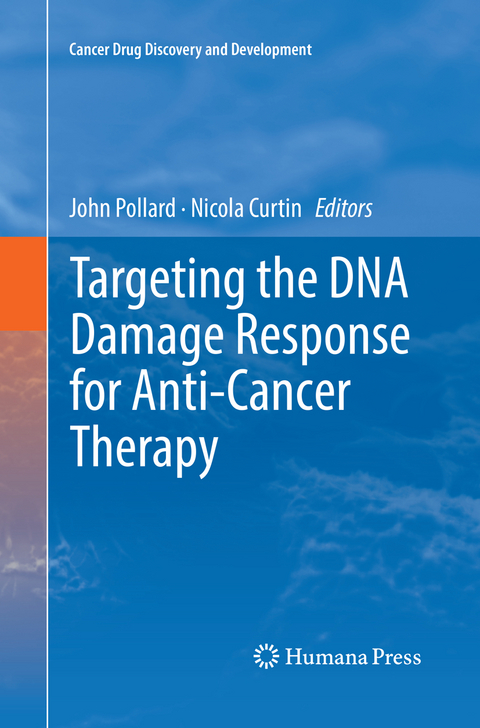
Targeting the DNA Damage Response for Anti-Cancer Therapy
Springer International Publishing (Verlag)
978-3-030-09336-5 (ISBN)
Over the past decade a complex role for DNA damage response (DDR) in tumorigenesis has emerged. A proficient DDR has been shown to be a primary cause for cellular resistance to the very many DNA damaging drugs, and IR, that are widely used as standard-of-care across multiple cancer types. It has also been shown that defects in this network, predominantly within the ATM mediated signaling pathway, are commonly observed in cancers and may be a primary event during tumorigenesis. Such defects may promote a genomically unstable environment, facilitating the persistence of mutations, any of which may provide a growth or survival advantage to the developing tumor. In addition, these somatic defects provide opportunities to exploit a reliance on remaining repair pathways for survival, a process which has been termed synthetic lethality. As a result of all these observations there has been a great interest in targeting the DDR to provide anti-cancer agents thatmay have benefit as monotherapy in cancers with high background DNA damage levels or as a means to increase the efficacy of DNA damaging drugs and IR.
In this book we will review a series of important topics that are of great interest to a broad range of academic, industrial and clinical researchers, including the basic science of the DDR, its role in tumorigenesis and in dictating response to DNA damaging drugs and IR. Additionally, we will focus on the several proteins that have been targeted in attempts to provide drug candidates, each of which appear to have quite distinct profiles and could represent very different opportunities to provide patient benefit.
John Pollard is Vice President, Principal Research Fellow and Head of Biological Sciences at Vertex Pharmaceuticals' UK research site. John joined Vertex in 1999 following a PhD at Southampton University and Postdoctoral positions at St. Andrews and Birmingham Universities in bioorganic chemistry. During his tenure at Vertex, John has led a series of oncology research and development projects across cell cycle control, survival and growth, and most recently DNA damage, which together have yielded multiple clinical candidates. John has served as global research lead for Vertex's oncology effort and led numerous collaborations with academic groups and pharma companies. Nicola Curtin is Professor of Experimental Cancer Therapeutics at Newcastle University, UK. After obtaining her Ph.D. in hepatocarcinogenesis from the University of Surrey she started working at Newcastle University, initially exploring novel therapies for liver cancer, then the cytotoxic mechanisms of novel antifolates and the role of nucleoside transport. Prof Curtin was a founding member of the Newcastle Anticancer Drug Discovery Initiative and contributed to the development of PARP inhibitors, including the identification of their synthetic lethality in cells lacking homologous recombination function. Her work focusses on the DNA damage response in general and she has also worked on the preclinical development of ATM, ATR and DNA-PK inhibitors for the treatment of cancer. In addition, she undertakes translational studies to identify pharmacodynamic biomarkers and those predictive of response to DDR-inhibitor therapy in cultured cells and patient material. She's also the co-editor of PARP Inhibitors for Cancer Therapy in this series.
1. Targeting DNA repair in anti-cancer treatments.- 2. The DNA damage response: roles in cancer etiology and treatment.- 3. Control of DNA Replication by ATR.- 4. Targeting ATR for cancer therapy: Profile & expectations for ATR inhibitors.- 5. Targeting ATR for cancer therapy: ATR-targeted drug candidates.- 6. ATM: its recruitment, activation, signalling and contribution to tumour suppression.- 7. Pre-clinical profile and expectations for pharmacological ATM inhibition.- 8. Targeting ATM for cancer therapy: Prospects for drugging ATM.- 9. Targeting Chk1 for cancer therapy: rationale, progress and prospects.- 10. Preclinical profiles and contexts for CHK1 and CHK2 inhibitors.- 11. Clinical development of CHK1 inhibitors.- 12. Established and emerging roles of the DNA-dependent protein kinase catalytic subunit (DNA-PKcs).- 13. Targeting DNA-PK as a therapeutic approach in oncology.- 14. Dbait: a new concept of DNA repair pathways inhibitor from bench to bedside.- 15. Alternative Non Homologous End-joining: Mechanisms and Targeting Strategies in Cancer.
"The book provides up to date and comprehensive review of hot topic in the field cancer drug discovery and development and represents a promising therapeutic strategy for cancer patients. It is the source of valuable information for people working in science and oncology clinics." (Jela Brozmanova, Neoplasma, Vol. 65 (06), 2018)
“The book provides up to date and comprehensive review of hot topic in the field cancer drug discovery and development and represents a promising therapeutic strategy for cancer patients. It is the source of valuable information for people working in science and oncology clinics.” (Jela Brozmanova, Neoplasma, Vol. 65 (06), 2018)
| Erscheinungsdatum | 14.01.2019 |
|---|---|
| Reihe/Serie | Cancer Drug Discovery and Development |
| Zusatzinfo | IX, 401 p. 80 illus., 52 illus. in color. |
| Verlagsort | Cham |
| Sprache | englisch |
| Maße | 155 x 235 mm |
| Gewicht | 629 g |
| Themenwelt | Medizin / Pharmazie ► Medizinische Fachgebiete ► Onkologie |
| Studium ► 2. Studienabschnitt (Klinik) ► Humangenetik | |
| Schlagworte | ATM • ATR • Chemotherapy resistance • CHK • DNA-PK • DNA repair • gene therapy • Ionising radiation • synthetic lethality |
| ISBN-10 | 3-030-09336-0 / 3030093360 |
| ISBN-13 | 978-3-030-09336-5 / 9783030093365 |
| Zustand | Neuware |
| Informationen gemäß Produktsicherheitsverordnung (GPSR) | |
| Haben Sie eine Frage zum Produkt? |
aus dem Bereich


